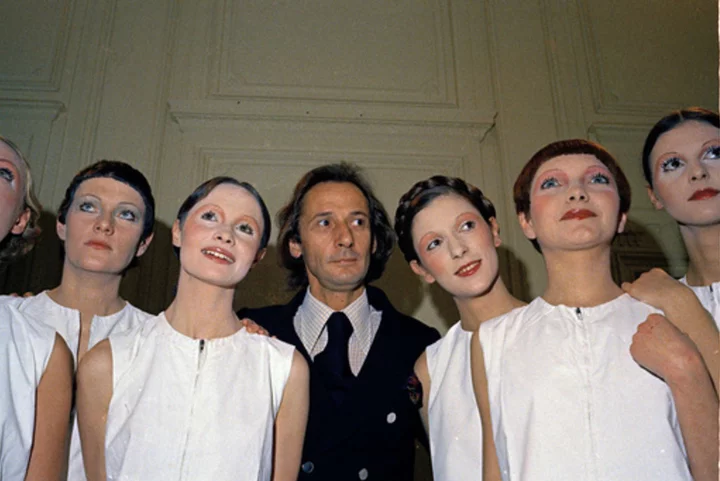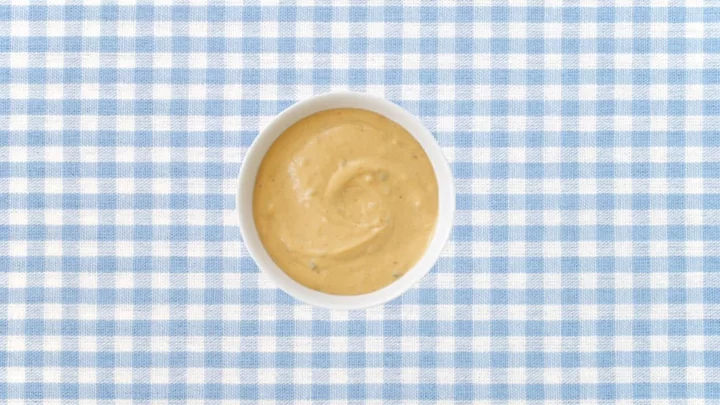
From piñata to postage stamp, US celebrates centuries-old Hispanic tradition
The U.S. Postal Service is rolling out its latest special edition postage stamps, paying homage to a Hispanic tradition that has evolved over centuries to become a universal symbol of celebration
2023-09-09 04:16

What are Blue Zones and how do they impact your health?
The secret to living a longer life isn’t found in some elixir or fountain of youth. Rather, it’s said to be found in Blue Zones. Blue Zones are the five regions in the world where people are known to live long, healthy lives. These areas are Okinawa, Japan; Sardinia, Italy; Nicoya, Costa Rica; Ikaria, Greece and Loma Linda, California. Here, the foods people eat aren’t just part of some diet - it’s a way of life. The term Blue Zone was popularised by Dan Buettner, a National Geographic journalist who travelled the world studying the cultures of these thriving communities. In a 2020 master class hosted by the Global Wellness Summit, Buettner shared the foundation of living in a Blue Zone: “The big epiphany of all these Blue Zones is that long-lasting health is very rarely successfully pursued; it ensues.” Now, not everyone can pack their bags and whisk themselves off to Italy, but there are many ways to adapt your daily routine to the Blue Zone lifestyle. Here’s what we can learn from these regions: Fibre, fibre, fibre Foods rich in fibre are prominently featured in the diets of those living in a Blue Zone. Beans and whole grains like brown rice and quinoa are high-fibre ingredients that can lengthen your life. Fruits, vegetables, and legumes are also natural sources of fibre. Fibre plays a key role in promoting gut health, managing your weight, and reducing cholesterol levels. Research shows that children and adults need at least 20 to 30 grams of fibre per day, but most Americans get only about 15 grams a day. Whether it’s garbanzo beans in Greek hummus to black beans in Costa Rican soup, increasing your fibre intake is key to living a longer life. Move naturally You don’t need to work out at the gym five times a week to increase your longevity. In fact, residents in Blue Zone areas rarely workout at all, as their exercise mostly comes from activities done throughout the day, such as walking and gardening. Incorporating 20 minutes of movement in your daily routine is just one way to live the Blue Zone lifestyle. Maintain a positive outlook On average, Americans spend nearly five to six hours on their phones a day, from the moment they wake up to the moment they go to bed. Instead, begin your daily routine with a positive meditation, or separate the work day with mini stress breaks. In Blue Zones, residents shed their stress by engaging in sacred daily rituals, such as remembering their ancestors in Okinawa or taking naps in Costa Rica. Or, do like the Sardinians do: happy hour. Connect with others Curating a social circle is one of the main pillars of living in a Blue Zone. In an era of Zoom calls and work from home, connecting with those around us has proven to be a little more difficult than in years past. Even if it’s just a small group, engaging with others who keep you active, eat a similar high-fibre diet, and care about you on a bad day can help you live until you’re 100. Read More 11 best healthy food subscription boxes delivered right to your door 10 best exercise bikes for smashing your fitness goals at home Five waste-free recipes to take your Veganuary up a notch What are Blue Zones and how do they impact your health? Three healthy recipes to get back on track after summer Best burgers in London: Where to eat top patties in the city
2023-09-09 03:23

Marc Bohan, former Dior creative director and friend to the stars, dies at age 97
Luxury fashion house Dior has confirmed that longtime former artistic director Marc Bohan has died at 97
2023-09-09 02:21

Hairspray star Sarah Francis Jones reveals she went into labour while attending Beyoncé concert
Hairspray actress Sarah Francis Jones has revealed that she went into labour while attending Beyoncé’s concert. In a video shared to Jones and her husband, actor Marcel Spears, Instagram accounts earlier this week, the Honey star spoke candidly about her experience at the show, which took place on 4 September at SoFi Stadium in Los Angeles. The post started off with the couple watching Beyoncé on stage, before the video transitioned to Jones in the hospital, as she appeared to be giving birth to her daughter. “POV: you go into labour at Beyoncé’s bday concert,” she wrote, referring to the show taking place on the singer’s 42nd birthday. Jones, who was featured in the 2007 Hairspray movie, went on to describe the unexpected experience of going into labour during the show. “We thought it was just Braxton hicks or gas,” she wrote in the caption. “Turns out we were having a whole baby at @beyonce bday show.” In the comments, many famous faces and fans congratulated Jones, while also poking fun at the timing in which started she going into labour. “CONGRATS SARAH!!! I love you so much!!!” Demi Lovato wrote, while comedian Malik Sanon added: “Your baby wanted to watch the show. Congrats bro.” “Baby girl dancing her way out at the concert!!!” a third wrote. “She said MOMMMM I NEED TO SEE QUEEN B WITH YOU WITH MY TWO EYES.” The new parents shared another joint Instagram post about the experience, which included a video of Jones at the concert and hospital, with text that read: “Beyonce induced my baby.” In the caption, Spears also added: “….stranger than fiction. God is good.” During an interview with KTLA, Jones recalled feeling contractions during the middle of the show. “I think it was right after the mute challenge,” she said, referring to concert guests pausing after Beyoncé sings the line “everybody on mute,” from her song “Energy”. “Everybody went mute. LA did very well … and then I started having contractions,” Jones continued. She emphasised that she thought the contradictions were a form Braxton Hicks, which are pains during pregnancy that are often mistaken for true labour contractions. According to Jones, as the pain continued, she took a break from dancing during show. “I said ‘Something’s happening,’” she recalled. “Usually I like to dance at the concert and I was like ‘Okay, I need to sit down for a second.’” Spears added that he first thought the contractions would “pass,” since the baby’s due date wasn’t for a few days. But as Jones’ labour pains continued, he started to time them, and noticed that the contractions were 20 to 30 minutes apart. From there, he said he and his wife made their way out of the stadium. “As the concert went on we were like ‘I don’t know about this.’ By the time we got to the car into the parking lot it was full-on intense,” he explained. The couple revealed that their newborn baby, Nola, arrived later that night on 5 September. While the baby’s first name is a reference to Spears’ hometown, the pair also noted that they haven’t decided on her middle name yet. However, they are open to a name that’s “Beyonce-like”. Spears also opened up about his and his wife’s decision to document the concert experience, sharing his belief that if they “didn’t record it,” he didn’t think “anybody would believe” what happened. “It’s just one of those things that it’s so convenient you’re like ‘Nah that’s not happening,’ but the baby definitely pulled through,” he said. The Independent has contacted Jones for comment. Read More Beyoncé fan reveals she wore wedding dress to concert to celebrate first year of marriage Keke Palmer brings boyfriend Darius Jackson to Beyoncé concert Meghan Markle has ‘adorable’ reaction after Prince Harry takes a selfie at Beyoncé concert Sophia Bush repurposes wedding dress for Beyoncé concert after Grant Hughes split Beyoncé fan reveals she wore wedding dress to concert on wedding anniversary Keke Palmer brings boyfriend Darius Jackson to Beyoncé concert
2023-09-09 00:56

Linda Evangelista says she views mastectomy scars as ‘trophies’ following recent breast cancer diagnosis
Linda Evangelista has opened up about how she’s maintained a positive perspective following her recent breast cancer diagnosis. This week, the 58-year-old supermodel revealed that she was diagnosed with breast cancer twice within the last five years. In an interview with Vanity Fair, Evangelista shared how she’s celebrating her life now after several years of health battles. “I’m in full celebration mode right now,” she told the outlet on 7 September. “I’ve had some health struggles and everything now is just a celebration.” The Canadian model first discovered she had breast cancer in 2018, after it was detected during her annual mammogram. She elected to undergo a bilateral mastectomy, a surgery done to remove both breasts as a way to treat cancer. Evangelista then felt a bump on her chest in July 2022, which she soon learned was cancer of the pectoral muscle. One year later, Evangelista has shared that she’s feeling healthier than ever and continues to find motivation in all aspects of her daily life. “I am very positive. It’s the new me,” she told Vanity Fair. “I think going through hardships and coming through the other end has made me focus only on the good things. I’m so happy to be alive. I know I am very fortunate.” While discussing her subsequent diagnoses, Evangelista revealed that she wasn’t concerned how the multiple surgeries to remove the cancer would impact her appearance. “I never felt like my breasts defined me as a woman,” she said of the bilateral mastectomy, which left scars across the skin of her chest. “I have always viewed scars on the body from surgeries, from disease, as trophies. They are like gold and shiny and should be on a mantle. It shows you won,” Evangelista added. “I think scars are to be celebrated and not to be looked at as bad and ugly. It makes you stronger.” Speaking to WSJ Magazine earlier this week, the Vogue cover star spoke about her private battle with cancer for the very first time. As to why she had kept “quiet” about her cancer diagnosis for so long, Evangelista admitted that she’s “not one of those people who has to share everything”. “I thought to myself, I will share this one day but while I am going through it, absolutely not,” she continued. “I don’t want the Daily Mail waiting outside my door like they do every time something happens. ‘Linda seen for the first time since blah blah blah.’” Evangelista explained that she decided to have a bilateral mastectomy to remove the cancerous breast tissue in 2018 because the “margins were not good” but she didn’t want to “deal” with undergoing cancer treatment. Four years later, she felt a bump on her chest and received an MRI scan. While she said her radiologist wasn’t initially concerned when she felt the bump, she noted that once the MRI was done, her doctor quickly ordered a biopsy. After discovering she had cancer in her pectoral muscle from the biopsy, Evangelista recalled saying to her doctors: “Dig a hole in my chest. I don’t want it to look pretty. I want you to excavate. I want to see a hole in my chest when you’re done. Do you understand me? I’m not dying from this.” Read More Linda Evangelista reveals she was diagnosed with breast cancer twice within last five years Linda Evangelista makes rare comment about co-parenting with son’s stepmother Salma Hayek Linda Evangelista says she still gets botox after CoolSculpting procedure that left her ‘disfigured
2023-09-09 00:28

The Mesh Grating on Your Microwave Is Actually an Important Safety Feature
To block microwave radiation, all you need is a simple screen.
2023-09-08 23:27

John Lennon’s Missing Patek Philippe Wristwatch Found in Geneva
A Patek Philippe watch given to John Lennon by his wife Yoko Ono shortly before his assassination in
2023-09-08 22:25

Thousand Island vs. Russian Dressing: What’s the Difference?
Russian dressing and Thousand Island dressing are two creamy sauces that are often confused for one another. So what’s the story?
2023-09-08 22:16

How the weather can change the way you dream
Everyone has a theory about their dreams and the science or meaning behind them. And when the weather hots up, the more bizarre they tend to get. “Dreams are a fascinating and enigmatic phenomenon that occur during sleep, encompassing a vast realm of imaginative experiences,” says sleep expert and CEO of MattressNextDay, Martin Seeley. “They are a collection of thoughts, images, sensations, and emotions that unfold within the theatre of our minds.” Why do we dream? When we sleep, our brain enters a complex state where it engages in various cognitive processes, explains Seeley, including memory consolidation, problem-solving and emotional regulation. “Dreams are thought to emerge from these processes, weaving together fragments of memories, desires, fears, and subconscious thoughts into a narrative or non-linear sequence,” adds Seeley. “And they can be surreal, vivid, or mundane, blurring the boundaries between reality and fantasy.” While the precise purpose and meaning of dreams remains a subject of exploration and debate, Seeley says they can serve as a portal into the inner workings of our minds: “Providing a canvas for exploration, processing of emotions, and glimpses into the subconscious depths of our psyche.” Why do we dream more when it’s hot? Lisa Artis, deputy CEO of The Sleep Charity, says: “When the weather is hot, it can disrupt our sleeping patterns, making it difficult to fall asleep in the first place – and causes us to wake more often during the REM (rapid eye movement) sleep phase.” REM sleep is where we experience intense dreaming, explains Artis – so waking during or at the end of this cycle can mean we are more likely to remember our dreams. “Dreams happen regularly, but are often forgotten and our mind’s way of unpacking the day’s events, dealing with stress and sorting through our day-to-day thoughts,” notes Artis. Our body heat generally peaks in the afternoon then starts to drop over an evening to prepare us for sleep, says Artis. Melatonin, the sleep hormone, is produced when this happens.“An ideal temperature is around 16-18°C and anything around the 24°C mark can cause restlessness,” says Artis. “So, it’s no surprise that when we’re experiencing a heatwave with temperatures reaching over 30°C, it affects our sleep.”Can a heatwave really make dreams more surreal? The connection between heatwaves and the content or nature of dreams is not fully understood. However, there may be a few possible explanations if your dreams seem weirder when the weather heats up – although Seeley points out these are all speculative. First off, he agrees it may have a lot to do with the fact we’re less comfortable and waking more when it’s hot. “These frequent awakenings can interrupt the normal sleep cycle and result in a higher probability of remembering dreams, including the more unusual or vivid ones,” he notes. “So, during a heatwave, the increased frequency of waking up during the night might contribute to a greater recall of strange or funky dreams.” Secondly, the body’s physiological response to heat may influence brain activity, he adds: “Heat can affect neurotransmitter levels, such as serotonin and dopamine, which play a role in regulating mood and emotions. These alterations in neurotransmitter activity might impact the content and emotional tone of dreams, potentially leading to more surreal or bizarre experiences.” Psychological factors could also play a role. Heatwaves can cause restlessness and increased stress levels in some individuals. Seeley adds: “Stress and emotional fluctuations can manifest in dreams as strange or unusual scenarios, as the mind processes and attempts to make sense of these experiences.” Can we stop strange heatwave dreams happening? While it’s probably not possible to completely control the content of our dreams, there are certain strategies you can try to promote better sleep – and potentially reduce the likelihood of experiencing a restless night and unusual dreams during hot weather. Create a cool sleep environment: “Use fans, air conditioning, or open windows to circulate cool air in your bedroom – and consider using lightweight, breathable bedding materials,” says Seeley. Stay hydrated: “Drink enough water throughout the day to prevent dehydration, especially during hot weather,” he continues. “Being adequately hydrated can help maintain a balanced sleep cycle.” Practice relaxation techniques: “Engage in activities that promote relaxation before bed, such as deep breathing exercises, meditation, or taking a warm bath,” suggests Seeley. “These practices can help calm your mind and promote a more restful sleep.” Read More Charity boss speaks out over ‘traumatic’ encounter with royal aide Ukraine war’s heaviest fight rages in east - follow live What are the royals doing to mark the anniversary of the Queen’s death All the times Kate has channelled the late Queen’s style since her death YouTube begins verifying videos by UK doctors to tackle health misinformation
2023-09-08 19:55

Everything Apple Plans to Show on Sept. 12: iPhone 15, Watches, AirPods
Apple Inc.’s most important new product unveiling of the year gets underway on Tuesday, when the company will
2023-09-08 19:51

India or Bharat? A dinner invite sparks speculation as Modi's ministers push to rebrand the country
India, the host nation of this year’s Group of 20 summit, has two official names
2023-09-08 18:24

5 things everyone needs to know about eczema
It’s easy to dismiss eczema as just itchy dry skin. But as millions of people know, the effects of eczema go way beyond this. “Eczema is so much more than ‘just an itch’,” says Andrew Proctor, chief executive of the National Eczema Society. “Affecting over eight million people in the UK, this incurable, highly visible skin condition has a huge impact on every aspect of a person’s life, extending far beyond the physical symptoms of itchy, inflamed, sore, cracked and bleeding skin. “Living with eczema means constantly having to plan and prepare, as every decision you make will potentially affect your skin. It shapes your home environment, education, career, social life, hobbies, holidays and relationships, and as a result, patients often report feeling anxious, depressed, self-conscious, isolated and helpless.” This National Eczema Week (September 9-16), here’s what Proctor wants everyone to know… 1. It doesn’t just affect children Atopic eczema affects one in five children and one in 10 adults in the UK. Proctor says: “While eczema is often viewed as a childhood condition, it affects people of all ages. Some develop eczema as babies, others in childhood, but thankfully it can improve over time.” Some people will have eczema all their life however, and some only develop it in their later years. “The important thing is to seek medical advice as soon as possible to get control of the eczema and develop an effective skincare routine,” advises Proctor. 2. It’s not contagious Proctor says that sadly, many people still think you can catch eczema. “However, atopic eczema isn’t contagious,” he stresses – pointing out it’s a complex condition involving genes, the immune system, the environment and our skin barrier. “This means skin becomes very dry and doesn’t provide sufficient protection from irritants, allergens and infection.” To tackle this, a foundation of eczema care is to apply medical moisturisers (emollients) to trap water in the skin and help reinforce the skin barrier. “Finding the emollient that suits your skin best can involve a lot of trial and error, but it’s critical to managing eczema,” says Proctor. 3. Environment plays a huge role Environmental factors can trigger eczema flare-ups or make it worse. Common culprits include stress, being too hot/cold or experiencing a sudden change in temperature, soap, shampoo and bubble bath, laundry detergent and cleaning products, perfume, pollens and moulds, pet fur, wool and synthetic fabric, and house dust mites. “Everyone will have certain things that trigger their eczema, and these vary between people,” Proctor explains. “Try keeping a diary to help identify triggers and patterns, so you can remove likely suspects and see if it helps. Triggers can also change over time and it’s worth continuing with the diary even if you think you’ve identified yours.” 4. It’s hard not to scratch Proctor explains: “One of the most maddening things you can say to someone with eczema is ‘stop scratching’. It’s not that simple! The unbearable, relentless itch is one of the defining features of the condition, and patients refer to it as torture. “You know you shouldn’t scratch, as it damages the skin and can cause infections, but the relief it provides is irresistible.” To help manage the itch, Proctor suggests finding a positive distraction or asking others to help you take your mind off it. You could also try substituting another action for scratching – press a nail on the itchy patch or tap the skin gently with your forefinger; keep your hands occupied with a ball, toy or other object; or wrap a bag of frozen peas in a towel and apply it to the itchiest area. 5. It’s a mental as well as physical battle Living with eczema is mentally exhausting too. “It can be a rollercoaster of emotions, from excitement when you start a new treatment, to despair when it doesn’t work or you experience a bad flare-up,” says Proctor. “There can be huge frustration too, when you do everything you’ve been asked and the eczema still refuses to give you any respite.” If this happens, as well as asking your GP or dermatologist for a review, it’s important to reach out to family and friends for support: “People who are able to open up about how their eczema truly affects them can feel a huge weight has been lifted.” Other ways to help cope include good nutrition and hydration, regular exercise, rest and relaxation. “Journaling, meditation and mindfulness can help you focus on the good things in your life and counterbalance negative feelings about eczema,” adds Proctor. “When so much time and effort goes into managing your eczema, it’s easy to forget there’s more to you than just your skin. Think about what you want to accomplish and formulate a plan. It’s about living successfully alongside eczema, not having your life defined by it.” For more information, visit eczema.org. The NES’ new video – More Than ‘Just An Itch’ – goes live on September 9 to mark National Eczema Week. Read More How many times a week you need to workout to get fit Shaquille O’Neal says he lost 55 pounds after being unable to climb stairs How did man who dodged theme parks due to his weight lose nearly 60kg? What your dog’s ear movements say about their health, according to a vet Terminally ill mum prepares for worst after numb hand turns out to be deadly disease Man who went to Turkey to make himself taller says pain was ‘worth it’
2023-09-08 18:16
